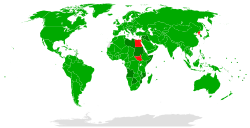Àgbájọ fún Ìdènà àwọn Ohun Ìjagun Ògùn Olóró
(Àtúnjúwe láti Organisation for the Prohibition of Chemical Weapons)
Àjọ tí ó ǹ rí sí ìdènà ohun ìjà ogun olóró (OPCW) jẹ́ àgbáríjọ àwọn ìjọba orílẹ̀-èdè àgbáyé intergovernmental organisation, tí olú iléeṣẹ́ wọn wà ní ìlú The Hague, ní orílẹ̀-èdèNẹ́dálaǹdì.
| Organisation for the Prohibition of Chemical Weapons | |
|---|---|
| Fáìlì:OPCW logo.gif OPCW logo | |
 Member states of the OPCW (green) | |
| Formation | 29 April 1997[1] |
| Headquarters | The Hague, Netherlands 52°05′28″N 4°16′59″E / 52.091241°N 4.283193°ECoordinates: 52°05′28″N 4°16′59″E / 52.091241°N 4.283193°E |
| Membership | 190 member states All states party to the CWC are automatically members. 6 states are non-members: Angola, Burma, Egypt, Israel, North Korea and South Sudan. |
| Official languages | English, French, Russian, Chinese, Spanish, Arabic |
| Director General | Ahmet Üzümcü[2] |
| Official organs | Conference of the States Parties Executive Council Technical Secretariat |
Àjọ yìí ń ṣègbé-lárugẹ ìfohùn-ṣọ̀kan lórí àwọn ohun ìjà ogun olóró onírúurú Chemical Weapons Convention ní èyí tì ó dènà lilo ohun ìjà kẹ́míkà okóró chemical weapons èyí tí ó lè mú ìparun wá. Ìfọn rere rẹ̀ yóò wáyénígbà tí àwọn orílẹ̀-èdẹ tí wọ́n jẹ́ alámòójútó bá ti fẹnu kò wípé kí ó rí bẹ́ẹ̀, lẹ́yìn tí wọ́n bá ti ṣàgbéyẹ̀wò rẹ̀ kíní kíní.

|
Àyọkà yìí tàbí apá rẹ̀ únfẹ́ àtúnṣe sí. Ẹ le fẹ̀ jù báyìí lọ tàbí kí ẹ ṣàtúnṣe rẹ̀ lọ́nà tí yíò mu kúnrẹ́rẹ́. Ẹ ran Wikipedia lọ́wọ́ láti fẹ̀ẹ́ jù báyìí lọ. |
Àwọn Itọ́ka sí
àtúnṣeÀdàkọ:''Ìkọ awọ́lẹ́ẹ̀gbẹ́''Reflist
- ↑ "Chemical Weapons - Organisation for the Prohibition of Chemical Weapons (OPCW)". United Nations Office for Disarmament Affairs. Retrieved 2013-10-11.
- ↑ Oliver Meier and Daniel Horner (November 2009). "OPCW Chooses New Director-General". Arms Control Association. http://www.armscontrol.org/act/2009_11/OPCW.